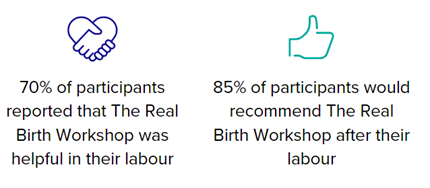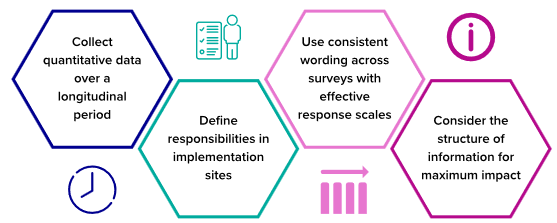NHS antenatal classes aim to provide expectant mothers with the knowledge they need to prepare them for birth. Quality Statement 22 (National Institute for Health and Care Excellence, 2012) suggests that antenatal care should be readily and easily accessible. Further, the Core20PLUS5 approach (NHS England, 2021) aims to help reduce health inequalities within maternity settings.
The Real Birth Workshop prepares women for birth through an online workshop. Participants can alter the language to suit their needs, making the workshop easier to understand for those whose first language is not English. Unity Insights were commissioned by Health Innovation Kent Surrey Sussex and The Real Birth Company to evaluate the impact of The Real Birth Workshop at East Kent Hospitals University NHS Foundation Trust.
Qualitative insights
The Real Birth Company created patient surveys, which identified the following:

Staff surveys identified the following:


Quantitative insights
The Real Birth Workshop participants were predominantly White (93%; n = 1,124) women between 18 and 35 years old (83%; n = 986). The number of participants who completed each module in QEQM and William Harvey Hospital, remained similar across both hospitals and showed a decrease, which was expected. Very few participants completed modules 9 to 11; module 9 was launched in February 2023 and modules 10 and 11 were launched in July 2023, hence, it was expected that these modules would have much lower completion frequencies.
Health inequalities insights
The Index of Multiple Deprivation (IMD) score for an East Kent population of women was identified and compared to The Real Birth Workshop population where 1 indicated the most deprived and 10 indicated the least deprived areas. There was a smaller proportion of The Real Birth Workshop participants with an IMD between one and three compared to the wider East Kent Hospitals NHS University Foundation Trust population of women who had given birth (27% versus 34% respectively).
Uptake was the highest in the 18 to 25 year age group (17% uptake) and smallest in the 36 to 40 year age group (9% uptake). This was likely to be due to the older cohort having previously conceived meaning they may realise fewer benefits from The Real Birth Workshop.
There was higher uptake of The Real Birth Workshop in both Black and Asian women when compared with background population (2.6% versus 1.6% and 3.6% versus 3.1% respectively). While the difference in Asian women had insufficient power to be statistically significant (z = 0.81, p > 0.05), the Black population was statistically significant (z = 2.34, p < 0.05). This means that the difference among the Black population was representative, however there was insufficient data to conclude the same for the Asian population.
Quantitative Insights
- Staff training occurred across an extended period of time due to maternity staffing pressures at the site and being unable to release staff for training. This resulted in difficulties making inferences around its impact on uptake levels. Further, longitudinal data was not available, which could have provided further insight into uptake following staff training.
- The comparator data consisted of a population of women who had given birth in East Kent Hospitals NHS University Foundation Trust between April 2021 and March 2022. The Real Birth Workshop data may include women who had experienced a miscarriage either whilst or after completing the workshop. Further, changes in societal, healthcare, or other relevant factors may have been present between the differing timeframes. This could potentially impact the conclusions made within the current evaluation as a result.
Qualitative Insights
- The pre- and post-birth participant surveys were worded differently, with some variance in response options. As such, comparison of responses between surveys may lack accuracy due to the inferences required.
- The staff survey generated a small sample size, meaning that conclusions may not be generalisable to the wider staff population. Further, few free-text responses were yielded within the staff survey. This meant that the depth of analysis was restricted.
The findings of the evaluation resulted in the following recommendations being made:

Overall, The Real Birth Workshop appeared to benefit both staff and patients due to its ease of use and insightful information presented within the workshop, which was suggested to contribute towards Quality Statement QS22 (National Institute for Health and Care Excellence, 2012). Future insight is required to understand the true impact of The Real Birth Workshop on health inequalities in terms of ethnicity, age, and deprivation levels to determine whether the workshop facilitates the Core20PLUS5 approach (NHS England, 2021).
National Institute for Health and Care Excellence. (2012). Antenatal care | Quality standard QS22. NICE. https://www.nice.org.uk/guidance/qs22/
NHS England. (2021). Core20PLUS5 An Approach to Reducing Health Inequalities. https://www.england.nhs.uk/publication/core20plus5-an-approach-to-reducing-health-inequalities-supporting-information/
Get in touch with us
- Phone
- Email enquiries@unityinsights.co.uk
